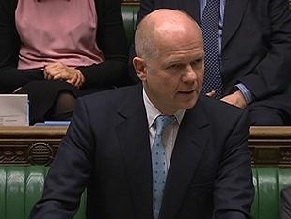|
World Jewish News

British Foreign Minister William Hague warned of US Secretary of State John Kerry’s recent attempts to resuscitate the stalled process that “this may be the last opportunity to achieve a two state solution”.
|
British FM Hague calls on ‘Israelis and Palestinians to show the courage that is necessary’ in stalled peace talks
12.07.2013, Israel and the World British Foreign Minister William Hague issued a rousing call to action on the Mid East peace Wednesday, as he warned of US Secretary of State John Kerry’s recent attempts to resuscitate the stalled process that “this may be the last opportunity to achieve a two state solution”.
The remarks made as part of a wide-ranging update to British parliament on the UK’s response to recent events across the Middle East region and North Africa, also saw him pay tribute to Kerry’s bold efforts to achieve resolution on the issue, which has seen him make a number of visits to the region since entering office earlier this year. Offering British support to EU and Arab initiatives in this vein, he called for “progress” to be reached on unresolved issues in Gaza, including full respect of last November’s Egyptian-brokered ceasefire and “a permanent end to rocket attacks (on Israeli territory) and an easing of Israeli restrictions”. “I call on Israelis and Palestinians to show the courage that is necessary,” he added, as he concluded that “the Middle East is vital to our national interests and security” and is strategically intertwined with Britain’s own immediate interests.
Elsewhere, Hague invoked the ongoing unrest in Egypt, which saw the country’s first-ever democratically-elected Islamist President Mohamed Morsi ousted by the military in a political coup last Tuesday, at the end of his first year in office. Acknowledging the move had been at the instigation of a large proportion of the Egyptian people, he nevertheless stressed that Britain “does not support military intervention into democratic politics”, as he further called for “an urgent return to democratic processes”.
Recognising the shortfalls of the demised Europe-heralded Muslim Brotherhood government in failing to deliver the “real democratic voice” demanded by the people as part of 2011’s popular uprisings, he added that “the hunger and aspiration for a better Egypt is as strong and urgent as ever. It is vital for their own country and the region that all sides rise above self interest and work towards an open, democratic and reforming Egypt”.
Echoing EU rhetoric in describing democratic transition as “a process, not an event” which requires patience and continued support from the emerging democracies’ western allies, he concluded that “achieving lasting positive change will be the work of a generation”.
On the issue of the ever-escalating Syrian conflict, Hague insisted Britain remained convinced of Iran’s financial and military enabling of Bashar al Assad’s authoritarian regime as well as Lebanese group Hezbollah’s military intervention on the ground, as he continued to stress the EU-backed belief that “a political transition in Syria remains the best hope of ending the violence”.
Calling on those responsible for the mounting death toll to be held accountable for their actions, he added that “the most important step to tackle the terrorism threat is to end the conflict and secure a transition to a new, legitimate government in Syria”. However, he cautioned, despite the international community’s reluctance to respond militarily to the crisis, “extremists should be in no doubt of the action we are prepared to take to protect our national security”, he cautioned, apparently invoking the recent decision by the EU foreign affairs council not to renew the arms embargo in Syria, paving the way for individual member states to arm opposition groups in the hopes of ousting the Assad regime.
Britain and France, along with key ally the US, have so far refused to rule out taking military action at some point in the future should they deem that international diplomacy aimed at achieving a political solution in Syria, has ultimately failed.
by: Shari Ryness
EJP
|
|
